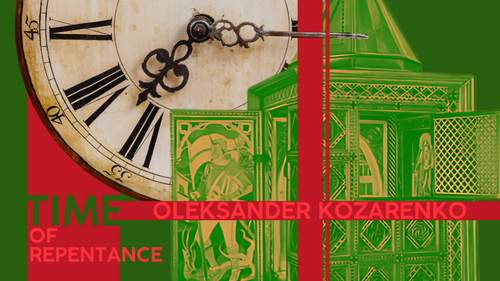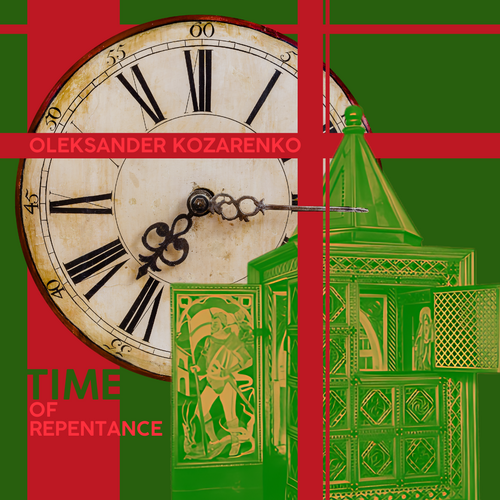The release is dedicated to the memory of Ukrainian composer, pianist, and musicologist Oleksandr Kozarenko (1963-2023), and marks one year since his death.
The chamber opera "Time of Repentance" (1997) for soloists and orchestra is one of the most significant works of Oleksandr Kozarenko, written on the verses of Ukrainian poets of the XVII-XVIII centuries Lavrentiy Hordiy, Ivan Velychkovskyi, Ivan Maksymovych, and Hryhoriy Skovoroda (libretto by Serhiy Stupak). The piece combines several artistic spheres that interested the composer – symphonic, vocal, and theatrical music, addressing sacred themes, integration, and actualization of ancient sources of Ukrainian culture (in this case, poetry), and so on.
The idea of the opera "Time of Repentance" is already laid down by the composer in its title: through experiencing sorrow and grief, acceptance, purification of thoughts, prayer, and ultimately, repentance, a person gets a chance to save their soul. The contemporary musical language of the opera serves as a guide from the lines of Ukrainian baroque poets to current philosophical and theological questions. Dialectical vision of the world, dimensions of the visible and the invisible, self-reflection and self-knowledge, return to life after suffering – here is an incomplete list of issues raised in the composer's work. The characters of the opera: She (soprano), Angel (mezzo-soprano), Conscience (tenor), and Temptation (bass-baritone). Throughout the nine sections of the opera, the main lyrical heroine meets each of the mentioned characters, transforming and reinterpreting her emotions, aspirations, and self-awareness.
The final episode repeats the beginning of the opera, forming an ideological arc. In this technique, the composer embodies the cyclicity of life on the one hand, and on the other, as if demonstrating a return to the primary source, another repetition of the acquired truth: everything is transient, everything passes, life consists of priceless moments, and nothing – neither good nor bad – will matter after death. However, Oleksandr Kozarenko changes the tragic message of Ivan Velychkovskyi's lines. Contrary to his verse, where it is written "the time of repentance will pass," the composer writes in the last line of the vocal text of the opera "The time of repentance will come....". The author leaves the listeners with a sense of hope, meaning that everyone will have the opportunity to realize their own mistakes and cleanse their souls.
The chamber opera "Time of Repentance" (1997) for soloists and orchestra is one of the most significant works of Oleksandr Kozarenko, written on the verses of Ukrainian poets of the XVII-XVIII centuries Lavrentiy Hordiy, Ivan Velychkovskyi, Ivan Maksymovych, and Hryhoriy Skovoroda (libretto by Serhiy Stupak). The piece combines several artistic spheres that interested the composer – symphonic, vocal, and theatrical music, addressing sacred themes, integration, and actualization of ancient sources of Ukrainian culture (in this case, poetry), and so on.
The idea of the opera "Time of Repentance" is already laid down by the composer in its title: through experiencing sorrow and grief, acceptance, purification of thoughts, prayer, and ultimately, repentance, a person gets a chance to save their soul. The contemporary musical language of the opera serves as a guide from the lines of Ukrainian baroque poets to current philosophical and theological questions. Dialectical vision of the world, dimensions of the visible and the invisible, self-reflection and self-knowledge, return to life after suffering – here is an incomplete list of issues raised in the composer's work. The characters of the opera: She (soprano), Angel (mezzo-soprano), Conscience (tenor), and Temptation (bass-baritone). Throughout the nine sections of the opera, the main lyrical heroine meets each of the mentioned characters, transforming and reinterpreting her emotions, aspirations, and self-awareness.
The final episode repeats the beginning of the opera, forming an ideological arc. In this technique, the composer embodies the cyclicity of life on the one hand, and on the other, as if demonstrating a return to the primary source, another repetition of the acquired truth: everything is transient, everything passes, life consists of priceless moments, and nothing – neither good nor bad – will matter after death. However, Oleksandr Kozarenko changes the tragic message of Ivan Velychkovskyi's lines. Contrary to his verse, where it is written "the time of repentance will pass," the composer writes in the last line of the vocal text of the opera "The time of repentance will come....". The author leaves the listeners with a sense of hope, meaning that everyone will have the opportunity to realize their own mistakes and cleanse their souls.
Камерна опера “Час покаяння”
Олександр Козаренко
Реліз присвячено памʼяті українського композитора, піаніста та музикознавця Олександра Козаренка (1963-2023), до першої річниці з дня його смерті.
Камерна опера “Час покаяння” (1997) для солістів і оркестру – один з найвагоміших творів Олександра Козаренка, написаний на вірші українських поетів XVII – XVIII століть Лаврентія Горки, Івана Величковського, Івана Максимовича та Григорія Сковороди (лібрето Сергія Ступака). Твір поєднує одразу кілька образно-жанрових сфер, якими цікавився і з якими активно працював композитор – симфонічну, вокальну та театральну музику, звернення до сакральної тематики, інтеграцію й актуалізацію давніх джерел української культури (в даному випадку, поезії) тощо.
Ідея опери “Час покаяння” закладена композитором вже у назві: через пережиття смутку та скорботи, прийняття, очищення думок, молитву та, врешті, покаяння людина дістає шанс спасти свою душу. Сучасна музична мова опери стає провідником від рядків поетів українського бароко до актуальних і нині філософсько-теологічних питань. Діалектичне бачення світу, виміри видимого і невидимого, самозаглиблення і самопізнання, повернення до життя після пережитих страждань – ось неповний перелік питань, які піднімає у творі композитор. Дійові особи опери: Вона (сопрано), Янгол (мецо-сопрано), Сумління (тенор) та Спокуса (бас-баритон).
Протягом девʼяти розділів опери головна лірична героїня зустрічається з кожним зі згаданих персонажів, трансформуючи і переосмислюючи свої емоції, прагнення та самовідчуття. Заключний епізод повторює початок опери, формуючи ідейну арку. У такому прийомі композитор втілює циклічність життя з одного боку, а з іншого – ніби демонструє повернення до першооснови, чергове повторення вже засвоєної істини: усе мінливе, усу минає, життя складається з безцінних митей, і будь що – ні добре, ні зле – не матиме значення після смерті. Щоправда, Олександр Козаренко змінює трагічний посил рядків Івана Величковського. Всупереч його віршеві, де написано «мине час покаяння» композитор виписує в останньому рядку вокального тексту опери «Прийде час покаяння....». Автор залишає слухачів з відчуттям надії, яке означає, що у кожного буде нагода усвідомити власні помилки та очистити свою душу.
Камерна опера “Час покаяння” (1997) для солістів і оркестру – один з найвагоміших творів Олександра Козаренка, написаний на вірші українських поетів XVII – XVIII століть Лаврентія Горки, Івана Величковського, Івана Максимовича та Григорія Сковороди (лібрето Сергія Ступака). Твір поєднує одразу кілька образно-жанрових сфер, якими цікавився і з якими активно працював композитор – симфонічну, вокальну та театральну музику, звернення до сакральної тематики, інтеграцію й актуалізацію давніх джерел української культури (в даному випадку, поезії) тощо.
Ідея опери “Час покаяння” закладена композитором вже у назві: через пережиття смутку та скорботи, прийняття, очищення думок, молитву та, врешті, покаяння людина дістає шанс спасти свою душу. Сучасна музична мова опери стає провідником від рядків поетів українського бароко до актуальних і нині філософсько-теологічних питань. Діалектичне бачення світу, виміри видимого і невидимого, самозаглиблення і самопізнання, повернення до життя після пережитих страждань – ось неповний перелік питань, які піднімає у творі композитор. Дійові особи опери: Вона (сопрано), Янгол (мецо-сопрано), Сумління (тенор) та Спокуса (бас-баритон).
Протягом девʼяти розділів опери головна лірична героїня зустрічається з кожним зі згаданих персонажів, трансформуючи і переосмислюючи свої емоції, прагнення та самовідчуття. Заключний епізод повторює початок опери, формуючи ідейну арку. У такому прийомі композитор втілює циклічність життя з одного боку, а з іншого – ніби демонструє повернення до першооснови, чергове повторення вже засвоєної істини: усе мінливе, усу минає, життя складається з безцінних митей, і будь що – ні добре, ні зле – не матиме значення після смерті. Щоправда, Олександр Козаренко змінює трагічний посил рядків Івана Величковського. Всупереч його віршеві, де написано «мине час покаяння» композитор виписує в останньому рядку вокального тексту опери «Прийде час покаяння....». Автор залишає слухачів з відчуттям надії, яке означає, що у кожного буде нагода усвідомити власні помилки та очистити свою душу.


